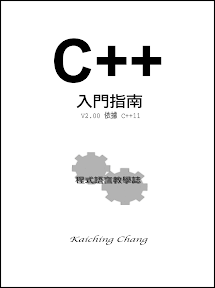
class_demo.cpp
#include <iostream>
using namespace std;
// 宣告類別
class Demo {
// 宣告 public 成員
public:
int a;
int b;
int DoSomething();
};
// 實作 Demo 的 DoSomething() 成員函數
int Demo::DoSomething() {
return a + b;
}
// 程式執行的 main()
int main(void) {
// 宣告並建立 Demo 型態的物件 t
Demo t;
t.a = 11; // 直接設定成員變數值
t.b = 22;
cout << endl;
// 呼叫並印出 do_something() 的回傳值
cout << t.DoSomething() << endl;
cout << endl;
return 0;
}
/* 檔名: class_demo.cpp
作者: Kaiching Chang
時間: 2014-5 */exercise1001.cpp
#include <iostream>
using namespace std;
class IntegerDemo {
public:
int value;
void Add(int);
};
void IntegerDemo::Add(int p) {
value += p;
}
int main(void) {
cout << endl;
IntegerDemo a;
a.value = 25;
cout << "a = " << a.value << endl;
a.Add(24);
cout << "a = " << a.value << endl;
cout << endl;
return 0;
}
/* 檔名: exercise1001.cpp
作者: Kaiching Chang
時間: 2014-5 */exercise1002.cpp
#include <iostream>
using namespace std;
class IntegerDemo {
public:
int value;
void add(int);
};
void IntegerDemo::add(int p) {
value += p;
}
int main(void) {
int input1;
int input2;
cin >> input1;
cin >> input2;
cout << endl;
IntegerDemo a;
a.value = input1;
cout << "a = " << a.value << endl;
a.Add(input2);
cout << "a = " << a.value << endl;
cout << endl;
return 0;
}
/* 檔名: exercise1002.cpp
作者: Kaiching Chang
時間: 2014-5 */exercise1003.cpp
#include <iostream>
using namespace std;
class IntegerDemo {
public:
int value;
void Add(int);
void Subtract(int);
};
void IntegerDemo::Add(int p) {
value += p;
}
void IntegerDemo::Subtract(int p) {
value -= p;
}
int main(void) {
int input1;
int input2;
int input3;
cin >> input1;
cin >> input2;
cin >> input3;
cout << endl;
IntegerDemo a;
a.value = input1;
cout << "a = " << a.value << endl;
a.Add(input2);
cout << "a = " << a.value << endl;
a.Subtract(input3);
cout << "a = " << a.value << endl;
cout << endl;
return 0;
}
/* 檔名: exercise1003.cpp
作者: Kaiching Chang
時間: 2014-5 */exercise1004.cpp
#include <iostream>
using namespace std;
class IntegerDemo {
public:
int value;
void Add(int);
void Subtract(int);
void Multiply(int);
};
void IntegerDemo::Add(int p) {
value += p;
}
void IntegerDemo::Subtract(int p) {
value -= p;
}
void IntegerDemo::Multiply(int p) {
value *= p;
}
int main(void) {
int input1;
int input2;
int input3;
int input4;
cin >> input1;
cin >> input2;
cin >> input3;
cin >> input4;
cout << endl;
IntegerDemo a;
a.value = input1;
cout << "a = " << a.value << endl;
a.Add(input2);
cout << "a = " << a.value << endl;
a.Subtract(input3);
cout << "a = " << a.value << endl;
a.Multiply(input4);
cout << "a = " << a.value << endl;
cout << endl;
return 0;
}
/* 檔名: exercise1004.cpp
作者: Kaiching Chang
時間: 2014-5 */exercise1005.cpp
#include <iostream>
using namespace std;
class IntegerDemo {
public:
int value;
void Add(int);
void Subtract(int);
void Multiply(int);
void Divide(int);
};
void IntegerDemo::Add(int p) {
value += p;
}
void IntegerDemo::Subtract(int p) {
value -= p;
}
void IntegerDemo::Multiply(int p) {
value *= p;
}
void IntegerDemo::Divide(int p) {
value /= p;
}
int main(void) {
int input1;
int input2;
int input3;
int input4;
int input5;
cin >> input1;
cin >> input2;
cin >> input3;
cin >> input4;
cin >> input5;
cout << endl;
IntegerDemo a;
a.value = input1;
cout << "a = " << a.value << endl;
a.Add(input2);
cout << "a = " << a.value << endl;
a.Subtract(input3);
cout << "a = " << a.value << endl;
a.Multiply(input4);
cout << "a = " << a.value << endl;
a.Divide(input5);
cout << "a = " << a.value << endl;
cout << endl;
return 0;
}
/* 檔名: exercise1005.cpp
作者: Kaiching Chang
時間: 2014-5 */exercise1006.cpp
#include <iostream>
using namespace std;
class FactorialDemo {
public:
int value;
void Run(int);
};
void FactorialDemo::Run(int p) {
int result = 1;
for (int i = 1; i <= p; i++) {
result *= i;
}
value = result;
}
int main(void) {
cout << endl;
FactorialDemo a;
a.Run(10);
cout << "10! = " << a.value << endl;
cout << endl;
return 0;
}
/* 檔名: exercise1006.cpp
作者: Kaiching Chang
時間: 2014-5 */exercise1007.cpp
#include <iostream>
using namespace std;
class FibonacciDemo {
public:
int value;
void Run(int);
};
void FibonacciDemo::Run(int n) {
int f0 = 0;
int f1 = 1;
int f2;
if (n == 0) {
value = f0;
}
else if (n == 1) {
value = f1;
}
else {
for (int i = 2; i <= n; i++) {
f2 = f0 + f1;
f0 = f1;
f1 = f2;
}
value = f2;
}
}
int main(void) {
cout << endl;
FibonacciDemo a;
a.Run(10);
cout << "f(10) = " << a.value << endl;
cout << endl;
return 0;
}
/* 檔名: exercise1007.java
作者: Kaiching Chang
時間: 2014-5 */the end

沒有留言:
張貼留言